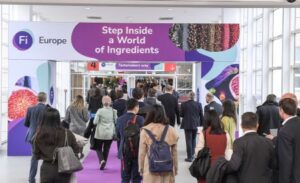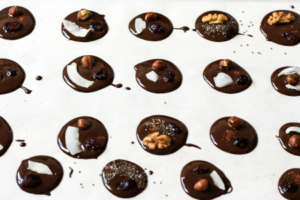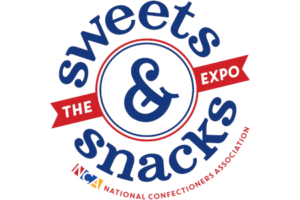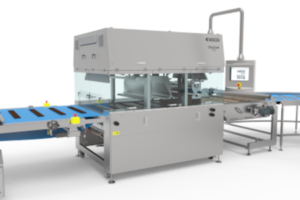ProSweets Cologne from 31.01.-03.02.2021 will underline how important packing is in terms of high buying impulses for sweets at the point of sale. At the supplier trade fair for the snacks and sweets industry, the exhibiting companies will present their latest innovations and progress with regards to sustainable and digital packing concepts. The controversy about plastic is definitely affecting the industry: The consumers are expecting environmentally-friendly solutions – whether made of recyclable mono films, paper packing or reusable solutions.
The market for sweets and snacks is changing. One of the themes that will intensively occupy the packing manufacturers at ProSweets Cologne 2021 is the need for sustainable packing concepts and completely recyclable (mono) materials. In this connection concrete stipulations are on their way from Brussels because the European Council has approved the introduction of the EU plastic tax from 1 January 2021 onwards. The plan foresees a duty of 80 Cent per kilogramme of non-reusable plastic packing waste, which is to be paid into the EU budget by the member states.
In addition to this, sustainability has a positive influence on the brand perception at the point of sale. According to a survey carried out by the market research institute, Ipsos, in the year 2019, three quarters of the consumers questioned worldwide prefer companies that pay attention to the sustainability of their products. In Germany, at 76% the share is similarly high. Beyond this there is also an increasingly stronger need to avoid packing that is detrimental to the environment and in the consumers’ opinion superfluous. More than three out of four consumers in this country state that they want to purchase products for which as less packing material is used as possible.
Paper an old acquaintance with potential
Hence, how the recycling share can be increased and how packaging waste can be reduced is high up on the agenda of the exhibiting companies at the Cologne fair grounds. The emphasis lies on strategies for less plastic, more renewable raw materials, lower packing weight and complete recyclability. The focus is being placed on an old faithful here: paper. The application options of paper as primary packaging for sweets has nowhere near been exploited yet. The aim is to replace a host of plastic packing with paper alternatives. However, that alone does not suffice: At the same time the new packaging options have to offer the accustomed convenience mechanisms of being easy to open and reseal or suitability for to-go usage. In most cases a thin barrier or plastic coating cannot be completely avoided, if the sweets and snacks are to retain their aroma and be kept fresh. In such cases, films made of completely recyclable mono materials are finding increased implementation. If the packing manufacturers combine the materials in such a way that the film can be easily separated from the paper and so that the fibre is not contaminated, the possibility of the material being reused is high.
However, not only the manufacturers of flexible packaging have set themselves the goal of using paper for the common plastic packing solutions. The machine manufacturers are also working on projects that enable paper to be formed and sealed without losses in performance. Chocal is demonstrating which concrete form this can take on with its tamper evident sealing technology, which enables pre-formed halves of paper to be sealed into packing material using a high-performance machine. In this way, the packing expert from Schwäbish-Gmünd aims to pave the way for more sustainability for unusually shaped chocolate figures, lollies or bars.
Natural film made of regrowing raw materials
And the latest progress goes much further than the implementation of paper and plastic. The industry is increasingly placing its bets on solutions made of regrowing raw materials that enable high-quality snacks and sweets to be packed in a wide range of films. Today, films that are made using fibres produced using sustainable methods offer the same high level of product protection as PE film or tinfoil. If the cardboard boxes of the chocolate bar are also FSC-certified and imprinted using dyes that are free from mineral oils, nothing stands in the way of a positive image at the point of sale.
How much packing is necessary and what alternatives are there? “The best packing waste is those that doesn’t exist,” Peter Désilets, Executive Director of Pacoon GmbH, is convinced. As a partner of Koelnmesse GmbH, the Munich-based agency for packing design and sustainability is presenting sustainable reusable packaging for sweets in the scope of the PACKAGING – “Function meets Design special event. It will no doubt amaze some of the visitors of ProSweets Cologne 2021 using which method crisps, jelly tots or nuts can be packed into reusable boxes with a deposit. The aim of the ReUse strategy presented in Cologne by Pacoon is “on the one hand to standardise the packing, but at the same time design it for different purposes,” explained Désilets. The materials are to be chosen in such a way that a permanent usage both as B2C and B2B packing is possible. Non-packaging shops and classic retail outlets are to benefit from this in equal shares, as well as the online mail order trade or the food service industry.
Making digitalisation experienceable
“The development towards more environmentally-friendly packaging in all sections, will permanently change our perception of what premium is,” said, Daniel Graf, convinced. Against this background, in the opinion of the Chairman and Executive Creative Director of Syndicate Design AG in Hamburg, digital brand management is also faced with special challenges. The digitalisation promises innovative options in the form of new printing and packing processes, also in terms of individualisation or personalisation. Implemented correctly, digital applications can turn buying into a special experience and ensure a positive image transfer – a theme which the company from Hamburg has picked up on. At the Cologne fair grounds, they are inviting visitors to join them for a “Breakfast Meeting”. “Packaging that communicates with the customers, will soon belong to everyday life,” commented Graf. Visitors will learn at the stand how brand experiences can be expanded with the aid of digital packaging – and where technical gadgets end, before the true added value begins.
The PACKAGING – “Function meets Design” special event is rounded off by guided tours on the theme “Sustainable Packing Concepts.” Experts from the DLG – the German Agricultural Society – will provide among other things answers as to which sustainable packing concepts currently exist for sweets and snacks and how the best possible protective function of packing can be implemented as sustainably as possible and in line with the consumers’ expectations. The tours lead to both the Packaging special event as well as to exhibitors, who are offering interesting lectures and projects on this theme.
The outlook of ProSweets Cologne 2021 shows: Packing is the basis of many sustainable strategies within the sweets industry, which will be reflected by a high number of innovative solutions at the Cologne fair grounds. The final decision on the topic of materials has not yet been taken. Whereby, traditional packing materials such as paper are increasingly taking areas of implementation by storm that were previously dominated by plastic. Parallel to this, digitalisation is gaining in significance. It offers new possibilities for advertising, communications and brand loyalty.
Koelnmesse – Global Competence in Food and FoodTec: Koelnmesse is an international leader in organising food fairs and events regarding food and beverage processing. Trade fairs such as the Anuga, ISM and Anuga FoodTec are established world leaders. Koelnmesse not only organises food and food technology trade fairs in Cologne, Germany, but also in further growth markets around the globe, for example, in Brazil, China, Colombia, India, Italy, Japan, Thailand and the United Arab Emirates, which have different focuses and contents. These global activities enable us to offer our customers a network of events, which in turn grant access to different markets and thus create a basis for sustainable and stable international business.









